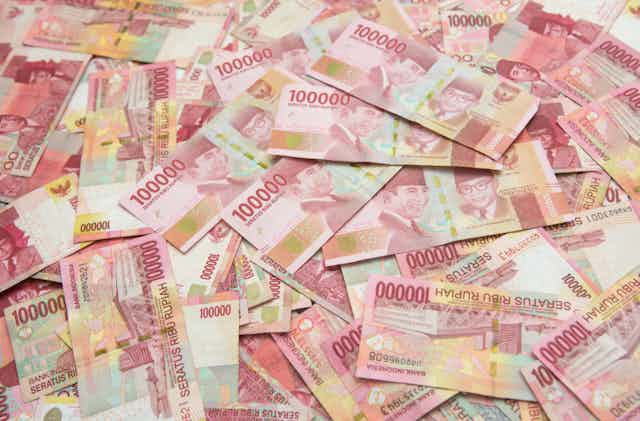Indonesia’s parliament passed the 2020 state budget in late September.
The 2020 budget, which outlines the country’s source of income and expenses, allocates around US$180 billion for the next fiscal year. The amount is a 3% increase from this year’s budget.
With such an increase, Indonesia, South East Asia’s largest economy and the world’s tenth largest, aims to improve domestic economic conditions while also anticipating future global economic uncertainties.
The government plans to invest in human capital, infrastructure, and efficient and corruption-free bureaucracy. The budget will also provide a buffer in case of a global economic downturn.
Five important changes
Aside from the increase, I observe five new things in the 2020 state budget that will impact Indonesian citizens and taxpayers:
1. Tax cuts for income and value-added taxes
The government is offering tax cuts for income tax and value-added tax (VAT) to meet the revenue target from those two categories.
The government often offers incentives in the hopes of boosting investment and competitiveness. The government wants to increase tax income from the two categories by 12%, to $114 billion this year.
For his second term, President Joko “Jokowi” Widodo will focus on revising the tax law to achieve those goals. The focus is different from his first term, during which his administration focused on a tax amnesty program.
For income tax, the government will reduce the tax rate for activities involving vocational training and research. Tax exemptions are also available for investments of up to US$35 million. The government will provide tax allowances for investments in regional enterprises.
For value-added tax, the government will provide tax cuts for imports of strategic goods such as machinery and factory equipment. Additionally, the government will not collect VAT for imports of mass transportation vehicles such as aircraft, vessels and trains.
2. Three new social security cards
The government will provide three new social support cards for low-income Indonesians.
The “College Smart Indonesia Card” (KIP Kuliah) will help low-income students enrol in tertiary education. The government has allocated US$473 million to provide 818,000 students with this card.
This card will complement the existing “Smart Indonesia Card” (KIP), which also provides education subsidies to low-income students for primary and secondary education.
The second card is the “Pre-Employment Card”, which helps job-seekers and low-income workers get vocational training or other forms of certifications. The government has allocated US$700 million for approximately two million cardholders.
And lastly, there is the “Basic Foods Card”, which provides food subsidies for 15.6 million low-income families. The government has allocated nearly US$2 billion for this subsidy.
Basic food programs were first implemented during the Yudhoyono administration in 2005, which aimed to support national efforts to alleviate poverty.
Under Jokowi, the food subsidy card is part of a larger strategy. Aside from providing food subsidies, the Jokowi administration also has programs to boost agricultural productivity. The government also offers cash handouts and housing credit programs.
For agriculture, Jokowi’s administration will provide US$1.87 billion to subsidise fertilisers for 16.2 million farmers. Related to housing, the government will also give a US$42 million subsidy, in the form of cash handouts, for housing instalments to 150,000 families, and even a US$275-million subsidy to 677,000 families for the payment of interests.
3. Increased budget for villages
The budget for village funds saw a 5.2% increase compared to 2019, to around US$60 billion to build infrastructure for education, health care, clean water services, as well as roads in villages.
4. A drop in total subsidies
The total funds allocated to subsidies dropped by 14% to around US$8.8 billion. The government achieved this by being selective in determining the subsidy recipients for electricity. Families with 450 and 900 Volt Ampere (VA) connections receive electricity subsidies.
5. Health budget cut and increase in defence and the police
Every ministry received a budget increase, except for the Ministry of Health, which saw a reduction of US$28 million to around US$4 billion.
The Defence Ministry and the National Police received the largest budget increase. The Defence Ministry’s budget grew by 20% to around US$9.2 billion, while the budget for the National Police increased by 11% to US$7.3 billion.
Strategies ahead
The next two years are important for Indonesia’s political economy. Indonesia will face challenges from global economy uncertainties due to the US-China trade war and geopolitical developments in the Middle East.
If Indonesia fails to anticipate the global economic uncertainty, its economy will likely experience stagnation.
The International Monetary Fund (IMF) has decreased its forecast for global growth to just 3.2% in 2019, from its initial projection of 3.3%. For next year, the agency estimates a 3.5% growth rate, lower than its previous forecast of 3.6%.
The slowdown of the global economy will undoubtedly impact conditions at home.
The upcoming recession will most likely be caused by supply shortages and will take longer to recover compared to the 2008 economic crisis. Demand shortages triggered the 2008 economic crisis.
Thus, the 2020 state budget is a strategic step to weather the coming storm.
With the budget, Indonesia will continue reforms on its national economic structure and, at the same time, encourage innovations and improve connectivity to value-added global production chains.
Hopefully, Indonesia will rise in the Global Innovation Index.
In 2019, the country was ranked 78 out of 2019 countries, far lower than other South East Asian countries such as Thailand (43rd), Malaysia (39th), Singapore (15th), and only slightly higher than Cambodia (84th).
If Indonesia survives the coming global economic turmoil and domestic challenges, it can come out as a nation with a more stable economy and a strong culture of innovation.


